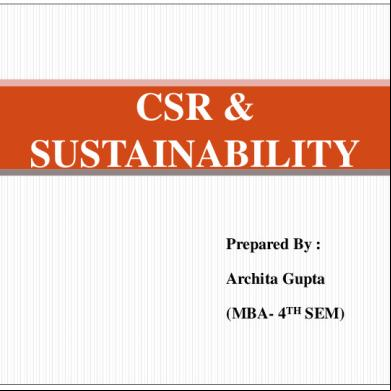4.2 Csr Implementation Process 4z6m1s
This document was ed by and they confirmed that they have the permission to share it. If you are author or own the copyright of this book, please report to us by using this report form. Report 3b7i
Overview 3e4r5l
& View 4.2 Csr Implementation Process as PDF for free.
More details w3441
- Words: 971
- Pages: 4
2. CSR IMPLEMENTATION PROCESS AND OUTCOME 2.1
Person Responsible for CSR Implementation in Companies
The survey reveals that the CSR Director followed by the CEO of the company is chief canvasser and the main person responsible for implementation of CSR initiatives across organisations. In case of PSUs, HR departments and istrative wings are also responsible for implementation of CSR activities besides CSR Director and the CEO (Fig.7). Fig 7: Person Responsible for CSR Implementation (In per cent)
70 60 50 40 30 20 10 0
53
49 37
36
36
27 27 18 9
9
3 3 5
0 0 1 CEO
PSU
20
18
10 14
CSR Director/Manager
istration
Private Agency (National)
HR Deptt.
Not Stated
Private Agency (Multinational)
All
Total exceeds 100 due to multiple responses
2.2 Stakeholders in CSR Implementation Process On the question of who are the stakeholders in the implementation of the CSR activities and initiatives, the survey reveals that the CSR initiatives are implemented through companies own CSR project management initiatives (68 per cent), voluntary organisations (29 per cent) and by giving financial directly to community or community-based organisations (11 per cent) (Fig 8). Fig. 8: Stakeholders in Implementation Process (In per cent)
11
Financial to Community based Organisations
8
11
20 29 25
Voluntary Organisation
35
25 68
Project Management Initiatives
66 64
0 PSU
10
20
30
Private Agency (National)
40
50
60
Private Agency (Multinational)
71
70
80 All
Total exceeds 100 due to multiple responses
2.3 Types of CSR Initiatives All participating respondents were asked whether the CSR initiatives implemented in the past three years were regular programmes or onetime events. The survey highlights that 84 per cent of the participating organisations implemented regular programmes whereas 7 per cent of organisations implemented one time CSR events. Similar trend is noticed in case of PSUs, private multi national and private national organisations (Table 3). Table 3 : Types of CSR Initiatives (In per cent) Public Private Agency Sector (Multinational) Undertaking
Type
Private Agency (National)
All
One-Time Events
18
3
9
7
Regular Programmes
82
82
88
84
Not Stated Total N*
0
15
3
9
11
39
32
82
*N=Universe Total exceeds N due to multiple responses
2.4 Outcome of CSR Initiatives Benefits of CSR On being asked if CSR is seen as a catalyst in bringing positive social change, almost all the respondents replied affirmatively. About threefifth of the organisations (59 per cent) work on CSR to improve perception about the company, while more than half (54 per cent) do so to brand the company among people. Tax benefit under 80G is a motivating factor in case of two-fifth of the organisations (43 per cent), while onetenth of the organisations (13 per cent) reported to be taking up CSR work as it is mandatory in their case (Fig. 9a). Fig 9a : Possible Benefits of CSR (In per cent) 100
91
90 80 70 60
55
54
50 40
56 54
51
56 59
43 36
36
30 20 10
51
10 9
31
13
0
As it has been made mandatory by Govt. PSU
To get Tax Benefits (under 80G) Private Agency (National)
To Brand Company among People
Improve Perception about Company
Private Agency (Multinational)
All
Total exceeds 100 due to multiple responses
The respondents were also asked about possible benefits of investing in CSR, the findings indicate that though goodwill is a common factor of CSR initiatives among all the three types of organisations, branding seems to be higher on agenda in case of private multinational companies. On the other hand PSUs seem to be more concerned about improving perception of the company in the eyes of the public and their stakeholders (Fig. 9b). Fig 9b : Possible Benefits of CSR (In per cent)
90
82
85
82
81
80
75 69
70 60
62
69
72
72
75
55
50 40 30 20 10 0 Goodwill PSU
Branding Private Agency (National)
Improved Perception about Company Private Agency (Multinational)
All
Total exceeds 100 due to multiple responses
Other possible benefits highlighted by the participating respondents include the following: • Positive and long-term relationship with communities • Nation-building and prosperity of region of their operations and activities • Providing where Government’s is inadequate and limited • Helping supply chain management and • ing creation of a healthy human resource base for the corporates
Perceptions about Tax Benefits Though CSR initiatives are not implemented with the sole intention of tax saving, half of the organisations surveyed (51 per cent) felt that Government’s proposal to abolish section 80G granting tax benefits would discourage CSR spendings by the companies. According to the survey findings, the rest of the organisations are divided in their views as 6 per cent believe that this is a good decision, 17 per cent are of the view that it will not affect the CSR spendings and yet another 6 per cent state that it does not have any relevance to CSR spending (Fig 10).
Fig 10 : Perceptions about Tax Benefits (In per cent)
6 6
Does not have any Relevance
8 0 0
17 16
It will not Affect
15 27 51
It will Discourage CSR spending by Companies/ Industries
50 56 36 6 13
This is good for Companies/ Industries 0 9
0
10
PSU
20
Private Agency (National)
30
40
Private Agency (Multinational)
50
60
All
Total exceeds 100 due to multiple responses
Factors Leading to Corporate Houses forming Foundations for CSR Work According to the survey findings, the factors which lead the corporate houses to form foundations for CSR-related work, include the following: •
Exclusive focus on CSR initiatives and activities
•
Demarcation of commercial activities from the social activities
•
Genuine social concerns for community
•
Transparency in CSR activities and
•
Generation of funds to CSR activities
Person Responsible for CSR Implementation in Companies
The survey reveals that the CSR Director followed by the CEO of the company is chief canvasser and the main person responsible for implementation of CSR initiatives across organisations. In case of PSUs, HR departments and istrative wings are also responsible for implementation of CSR activities besides CSR Director and the CEO (Fig.7). Fig 7: Person Responsible for CSR Implementation (In per cent)
70 60 50 40 30 20 10 0
53
49 37
36
36
27 27 18 9
9
3 3 5
0 0 1 CEO
PSU
20
18
10 14
CSR Director/Manager
istration
Private Agency (National)
HR Deptt.
Not Stated
Private Agency (Multinational)
All
Total exceeds 100 due to multiple responses
2.2 Stakeholders in CSR Implementation Process On the question of who are the stakeholders in the implementation of the CSR activities and initiatives, the survey reveals that the CSR initiatives are implemented through companies own CSR project management initiatives (68 per cent), voluntary organisations (29 per cent) and by giving financial directly to community or community-based organisations (11 per cent) (Fig 8). Fig. 8: Stakeholders in Implementation Process (In per cent)
11
Financial to Community based Organisations
8
11
20 29 25
Voluntary Organisation
35
25 68
Project Management Initiatives
66 64
0 PSU
10
20
30
Private Agency (National)
40
50
60
Private Agency (Multinational)
71
70
80 All
Total exceeds 100 due to multiple responses
2.3 Types of CSR Initiatives All participating respondents were asked whether the CSR initiatives implemented in the past three years were regular programmes or onetime events. The survey highlights that 84 per cent of the participating organisations implemented regular programmes whereas 7 per cent of organisations implemented one time CSR events. Similar trend is noticed in case of PSUs, private multi national and private national organisations (Table 3). Table 3 : Types of CSR Initiatives (In per cent) Public Private Agency Sector (Multinational) Undertaking
Type
Private Agency (National)
All
One-Time Events
18
3
9
7
Regular Programmes
82
82
88
84
Not Stated Total N*
0
15
3
9
11
39
32
82
*N=Universe Total exceeds N due to multiple responses
2.4 Outcome of CSR Initiatives Benefits of CSR On being asked if CSR is seen as a catalyst in bringing positive social change, almost all the respondents replied affirmatively. About threefifth of the organisations (59 per cent) work on CSR to improve perception about the company, while more than half (54 per cent) do so to brand the company among people. Tax benefit under 80G is a motivating factor in case of two-fifth of the organisations (43 per cent), while onetenth of the organisations (13 per cent) reported to be taking up CSR work as it is mandatory in their case (Fig. 9a). Fig 9a : Possible Benefits of CSR (In per cent) 100
91
90 80 70 60
55
54
50 40
56 54
51
56 59
43 36
36
30 20 10
51
10 9
31
13
0
As it has been made mandatory by Govt. PSU
To get Tax Benefits (under 80G) Private Agency (National)
To Brand Company among People
Improve Perception about Company
Private Agency (Multinational)
All
Total exceeds 100 due to multiple responses
The respondents were also asked about possible benefits of investing in CSR, the findings indicate that though goodwill is a common factor of CSR initiatives among all the three types of organisations, branding seems to be higher on agenda in case of private multinational companies. On the other hand PSUs seem to be more concerned about improving perception of the company in the eyes of the public and their stakeholders (Fig. 9b). Fig 9b : Possible Benefits of CSR (In per cent)
90
82
85
82
81
80
75 69
70 60
62
69
72
72
75
55
50 40 30 20 10 0 Goodwill PSU
Branding Private Agency (National)
Improved Perception about Company Private Agency (Multinational)
All
Total exceeds 100 due to multiple responses
Other possible benefits highlighted by the participating respondents include the following: • Positive and long-term relationship with communities • Nation-building and prosperity of region of their operations and activities • Providing where Government’s is inadequate and limited • Helping supply chain management and • ing creation of a healthy human resource base for the corporates
Perceptions about Tax Benefits Though CSR initiatives are not implemented with the sole intention of tax saving, half of the organisations surveyed (51 per cent) felt that Government’s proposal to abolish section 80G granting tax benefits would discourage CSR spendings by the companies. According to the survey findings, the rest of the organisations are divided in their views as 6 per cent believe that this is a good decision, 17 per cent are of the view that it will not affect the CSR spendings and yet another 6 per cent state that it does not have any relevance to CSR spending (Fig 10).
Fig 10 : Perceptions about Tax Benefits (In per cent)
6 6
Does not have any Relevance
8 0 0
17 16
It will not Affect
15 27 51
It will Discourage CSR spending by Companies/ Industries
50 56 36 6 13
This is good for Companies/ Industries 0 9
0
10
PSU
20
Private Agency (National)
30
40
Private Agency (Multinational)
50
60
All
Total exceeds 100 due to multiple responses
Factors Leading to Corporate Houses forming Foundations for CSR Work According to the survey findings, the factors which lead the corporate houses to form foundations for CSR-related work, include the following: •
Exclusive focus on CSR initiatives and activities
•
Demarcation of commercial activities from the social activities
•
Genuine social concerns for community
•
Transparency in CSR activities and
•
Generation of funds to CSR activities










